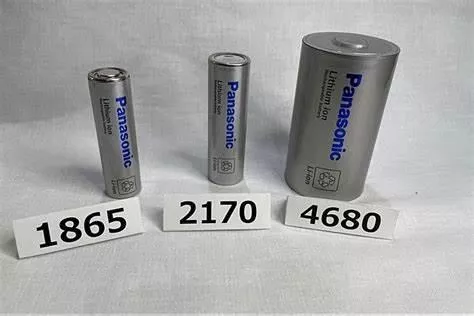On Wednesday, Panasonic's chief financial officer hiroho Meitian disclosed in a statement that Tesla is asking Panasonic holdings to accelerate the development of 4680 batteries According to Meitian, Tesla's demand for 2170 batteries remains strong. Although Meitian did not provide details about Panasonic's upcoming plant in the United States, he stressed that there was still a large demand for the 2170 battery produced by the company for Tesla. Panasonic's 2170 battery is used in model 3 and model y models produced by Tesla's Fremont plant in California.

Meitian also hinted that Tesla is promoting Panasonic to increase the development of 4680 batteries. "We can't disclose more information than what has been published, but we have received many requests. We see that Tesla has a strong and continuous demand for 2170 batteries, but we are also asked to speed up the development of 4680 batteries," he said
According to Bloomberg, Panasonic is considering establishing a new battery factory in the United States to supply 4680 batteries for Tesla Motors. The candidate locations are Oklahoma and Kansas. Production will begin as early as 2024. Panasonic plans to operate the factory independently.
In recent months, Oklahoma and Kansas have been developing fiscal incentives to attract jobs from the Japanese company and factory. For Panasonic, the advantage of choosing these two places is that they are close to Tesla's new plant recently opened in Texas.
Panasonic has jointly operated a battery plant with Tesla in Nevada. Its initial production capacity is 35 gigawatt hours per year. Panasonic has invested about 200 billion yen (US $1.5 billion), and its current production capacity is about 39 gigawatt hours per year. The new plant may have a similar size.
As early as 2020, Tesla announced 4680 batteries. 4680 battery is a new type of battery with larger size, which has lower cost and higher energy density. Its diameter is 46 mm and its height is 80 mm. Due to the higher battery capacity, the 4680 battery can effectively reduce the number of electric vehicle batteries, so the manufacturing cost is lower. At the same time, the higher capacity also helps to improve the endurance.
The model y produced by Tesla's super factory in Texas has used 4680 batteries. Tesla is currently deploying the production capacity of 4680 batteries at the Texas super factory and Berlin. It is expected that there will be no shortage of batteries before it starts producing cybertruck next year. An ordinary cybertruck may use twice the battery capacity of Tesla's ordinary model 3 and model y (its most popular models). In addition, Tesla plans to produce 500000 cars a year at its plant in Texas, which will greatly increase Tesla's demand for batteries. Tesla plans to achieve its goal by relying on internal production and establishing cooperation with battery suppliers.
In addition to supplying Tesla factory, Panasonic will also consider selling products to other electric vehicle manufacturers in the future. Of course, the competition between electric vehicle battery manufacturers is very fierce. South Korea's LG energy solutions and general motors are investing $2.6 billion to build a battery plant in Lansing, Michigan. Ningde times is investing up to US $6 billion in battery projects in Indonesia with local partners.
According to the data of South Korea SNE research company, Ningde era ranked first in the global electric vehicle battery market in 2021, with a share of about 33%, followed by LG energy company, accounting for 20%. Panasonic ranked third, accounting for 12%.